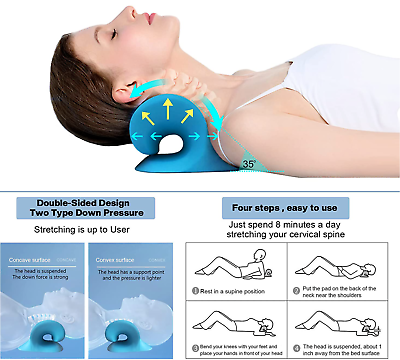Neck Cloud for Cervical Support: Unwind and Relieve Neck Discomfort
Neck Cloud for Cervical Support: Unwind and Relieve Neck Discomfort
Blog Article
The Impact of Stress And Anxiety on Neck Discomfort: Strategies for Minimizing Tension and Pain
In today's busy world, it's no trick that stress has actually come to be a common aspect in the onset and worsening of neck discomfort. Join us on a trip to decipher the effect of tension on neck discomfort and find effective means to reduce discomfort and boost general quality of life.
Recognizing Stress-Related Neck Discomfort
Stress-related neck discomfort can show up as stress, stiffness, or discomfort in the neck and shoulder area. The link in between tension and neck discomfort exists in the body's physical action to stress and anxiety, which can result in muscle tension and rigidity in the neck muscular tissues.

Identifying Common Stress Areas
One common tension location is the neck, where tension usually manifests physically. Tension headaches, tight neck muscular tissues, and restricted variety of motion are common signs and symptoms of stress-related neck stress. Being conscious of these usual tension areas can assist people recognize the physical indications of tension and take steps to address them prior to they escalate into persistent pain or pain.
Applying Leisure Strategies
Relaxation strategies are useful devices for minimizing neck pain triggered by stress. In addition, tasks like yoga exercise and tai chi incorporate both physical motion and leisure, making them effective methods for minimizing tension and neck discomfort. By incorporating these relaxation methods into your day-to-day regimen, you can aid handle stress degrees, decrease stress in the neck, and minimize pain associated with stress-induced neck discomfort.
Integrating Self-Care Practices
Including self-care methods is important for maintaining overall well-being and managing stress-related neck pain efficiently. Participating in normal exercise, such as gentle stretching exercises or yoga exercise, can help relieve stress in the neck and shoulders. Exercising excellent position throughout the day and taking constant breaks from extended sitting or screen time can also avoid pressure on the neck muscles.
Additionally, focusing on sufficient rest and developing a consistent rest regimen can add considerably to decreasing anxiety levels and promoting relaxation. Producing a soothing going to bed routine, such as reviewing a book or taking a cozy bath, can help prepare the mind and body for relaxing rest. Additionally, keeping official website a balanced diet plan rich in nutrients and staying moisturized can sustain general health and wellness and reduce swelling that might intensify neck discomfort.
Incorporating mindfulness techniques, such as deep breathing exercises or reflection, can assist manage tension and promote relaxation. Requiring time for oneself, participating in pastimes, and establishing limits to secure individual time are likewise vital facets of self-care that can add to lowering tension and reducing neck pain.
Looking For Specialist Assistance
Exactly how can people properly attend to persistent neck discomfort that is affecting their everyday life and health? Looking for expert assistance can be a vital step in handling and easing neck pain.
Chiropractics physician concentrate on spine adjustment strategies to boost alignment and reduce stress in the neck area. Physical therapists supply targeted stretches and workouts to enhance muscle mass, boost versatility, and boost total neck function. Orthopedic professionals can provide innovative medical treatments such as shots or surgical alternatives for serious cases of neck pain.
Final Thought

Stress-related neck discomfort can materialize as stress, stiffness, or discomfort in the neck and shoulder area. The link in between stress and neck discomfort exists in the body's physiological response to stress and anxiety, which can result in muscle stress and tightness in the neck muscular tissues. Tension headaches, pop over to this web-site rigid neck muscular tissues, and limited array of activity are usual signs of stress-related neck stress. By incorporating these leisure techniques right into your daily routine, you can help manage stress and anxiety levels, reduce stress in the neck, and relieve discomfort associated with stress-induced neck discomfort.

Report this page